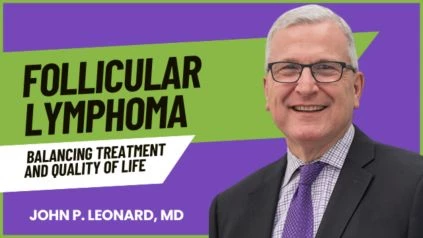By: Allen Wilbanks
Date: September 27 /2023
John Leonard, MD, a prominent figure in the field of oncology, delivered a thought-provoking presentation at a medical conference. His words were a reflection of his deep commitment to improving patient outcomes and quality of life. In his address, he discussed various aspects of treating lymphomas, particularly follicular lymphoma and diffuse large B cell lymphoma, emphasizing the importance of considering these factors when making treatment decisions.
Dr. Leonard began his talk with gratitude, saying, “Thanks very much. I appreciate the opportunity to present. This was kind of an open discussion topic.”
He explained his choice of topic by saying, “So, I tried to pick something that was not really covered elsewhere in the meeting, and that would hopefully be stimulating for further discussion.”
Throughout his presentation, Dr. Leonard raised essential questions and made insightful observations. He delved into the core reasons for treating medical conditions, stating, “And really any medical condition unless somebody can think of a fourth reason. It’s either to cure the person, which is obviously relevant in large cell lymphoma. Perhaps less so, though not irrelevant in follicular lymphoma, to extend survival and improve quality of life.”
He acknowledged the challenges of defining a cure, saying, “Certainly if you die before you have a relapse, if that’s the definition of a cure, even if we did some sort of total body tests and found some lymphoma there, If the patient dies hopefully at a normal life expectancy, without having a relapse, that essentially is a functional cure. And I think we do have functional cure for some patients with follicular lymphoma.”
Dr. Leonard also emphasized the need to consider the trade-offs between treatment intensity and quality of life, noting, “So typically more aggressive therapy, longer remission, more short term toxicity, less aggressive regimens, less short term toxicity, shorter response or progression, But again, then the patient progresses and what’s what’s their quality of life, etcetera there, the toxicity of the treatment versus the toxicity of the disease, the pros and cons of maintenance.”
He highlighted the challenge of measuring and acting on quality of life data effectively, stating, “We do a really crummy job of measuring and acting on quality of life data in any kind of rigorous, robust scientific way. But yet, for follicular lymphoma patients, this is the driver of how their life’s gonna go in the majority of patients. So I think it’s incumbent upon us to do better.”
In discussing large cell lymphoma, Dr. Leonard emphasized the importance of curing patients, extending survival, and considering quality of life in treatment decisions. He also presented hypothetical scenarios to illustrate how quality of life might impact treatment choices, even in cases where a cure is not achievable.
In conclusion, Dr. John Leonard’s presentation was a thought-provoking exploration of the complexities involved in making treatment decisions for lymphoma patients. His insights underscored the need for a more comprehensive approach that considers not only clinical outcomes but also quality of life and patient preferences.

